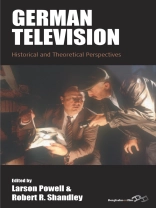Long overlooked by scholars and critics, the history and aesthetics of German television have only recently begun to attract serious, sustained attention, and then largely within Germany. This ambitious volume, the first in English on the subject, provides a much-needed corrective in the form of penetrating essays on the distinctive theories, practices, and social-historical contexts that have defined television in Germany. Encompassing developments from the dawn of the medium through the Cold War and post-reunification, this is an essential introduction to a rich and varied media tradition.
Innehållsförteckning
List of Figures
Introduction
Larson Powell and Robert Shandley
PART I: TECHNICAL PREHISTORY AND THEORETICAL APPROACHES
Chapter 1. Contingencies and Ruptures in the Technological History of Television
Wolfgang Hagen
Chapter 2. Boredom, War and Paradox: German Theories of Television
Larson Powell
PART II: GDR TELEVISION
Chapter 3. ‘Just Like in the West, Except Different:’ Television and its Relationship to Film in the Context of 1950s GDR Development
Thomas Beutelschmidt
Chapter 4. Adventures in Stagnation: Gottfried Kolditz’s Unfilmed Project Zimtpiraten
Evan Torner
PART III: TELEVISION IN THE FEDERAL REPUBLIC: AUTEURIST TV
Chapter 5. “A challenge, maybe the greatest for a filmmaker”: Televisual Perspectives on Rainer Werner Fassbinder’s Martha (1974)
Brad Prager
Chapter 6. Nah am Fern: Kluge TV
Stefanie Harris
PART IV: PRESENT AND FUTURE PERSPECTIVES
Chapter 7. Television History in Germany: Media-Political and Media-Ethical Aspects
Rüdiger Steinmetz
Chapter 8. Germany as TV Show Import Market
Lothar Mikos
Chapter 9. Heritage, Heimat, and German Historical ‘Event Television’: Nico Hofmann’s team Worx
Paul Cooke
Chapter 10. Once Upon a Crime: Tatort, Germany’s Longest Running Police Procedural
Bärbel Göbel-Stolz
Bibliography
Om författaren
Robert Shandley is Professor of German and Film Studies at Texas A&M University. His most recent books include Hogan’s Heroes (TV Milestones Series, 2011) and Runaway Romances: Hollywood’s Postwar Tour of Europe (2009).












